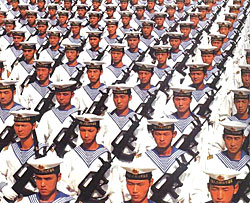 |
Nor for that matter, have the US, Europe or other major powers cracked China's code and their policy towards Beijing often seems to be set on the fly. Those countries that have done well on China include those who sell it goods: Australia, South Africa, Brazil, even Angola and Sudan.
China's hunger for minerals from those places is well known, even as it buys up US government debt and sells cheap widgets to Western consumers to pay for it all. China has leapt into Africa with bags of money and dynamism, criss-crossing a continent that the West long treated like a collective basket case. In the process many countries once considered to be moribund with war and corruption have witnesses great leaps forward in GDP and government revenues.
Now comes news that Beijing is taking steps to shore up flagging food production at home by purchasing huge farm tracts in dozens of poorer places and introducing production intensive agriculture.
Copper, coal, steel and other commodities are being stockpiled in anticipation of wild price fluctuations in the global meltdown that's engulfing most of us at the moment. China's flaunting its naval and other military prowess, quietly encouraging North Korea to needle the Americans with claims of nuclear and missile tests and frightening its old adversary India by building sea bases in Sri Lanka, Burma and elsewhere.
A blue water fleet that includes at least one aircraft carrier is a mailed fist with reach and the message isn't lost in New Delhi, which has never signed a peace treaty with Beijing after a humiliating military defeat in a 1962 war that resonates still in Indian strategic planning sessions even today.
In short, China is on the move. It is coping well with the global economic slowdown and decline in US and European demand. One obvious reason is that China has a robust domestic economy that buys about half of its output and is carefully developing a wide variety of trading partners around the world, including India.
The trial balloon late last year by a Chinese Central Banker that speculated about ending the role of the US dollar as de-factor world currency was no accident. China might as well be the world's banker now, given its acquisitions on every continent and carefully stewarded external and internal finances.
Not that we should fear China's imperial ambitions. The Middle Kingdom is driven by national pride but has no obvious inkling to conquer territory or fight military conflicts.
In Nepal, Beijing is still focussed on Tibet-related policies in the short term and access to blue water ports and markets in India in the future. That could include a Lhasa to Calcutta train, better highways and pipelines from Central Asia.
Stability here is also important to Beijing and its seeing little of that lately. Nepal needs to do many things but first among them on the foreign policy front is coming up with a sensible national consensus about China, balancing local interests as always with what Delhi expects from this country.
Given the perpetually squabbling mediocrities who dominate Kathmandu politics it's hard to have confidence that this will happen. It's much easier to combine currying favour in the most sycophantic way, with underhanded unilateralism. These behaviours are more typical of the men who've ruled Nepal for decades, through authoritarianism, democracy, civil war, royal rule and faltering peace process.
At the end of the day, China could easily decide it has bigger fish to fry than the minnows who swim the political currents in this capital. It will be to this country's great cost but that doesn't seem to bother anyone who aspires to power here.
Daniel Lak's latest book is the India Express.



